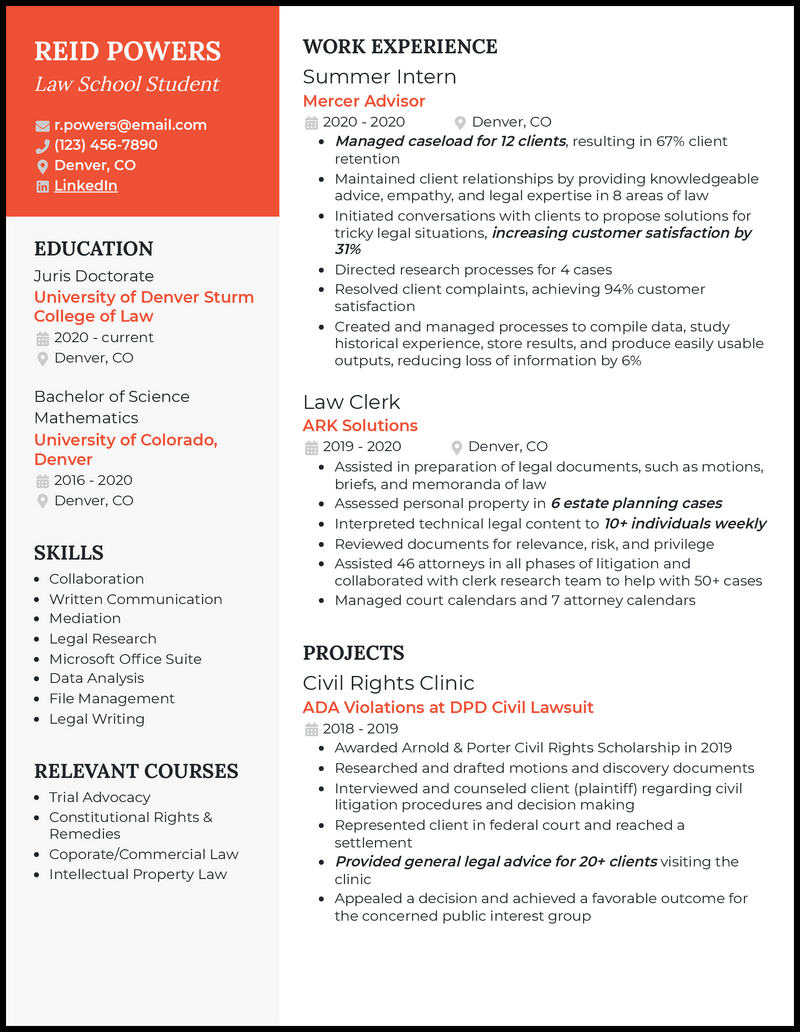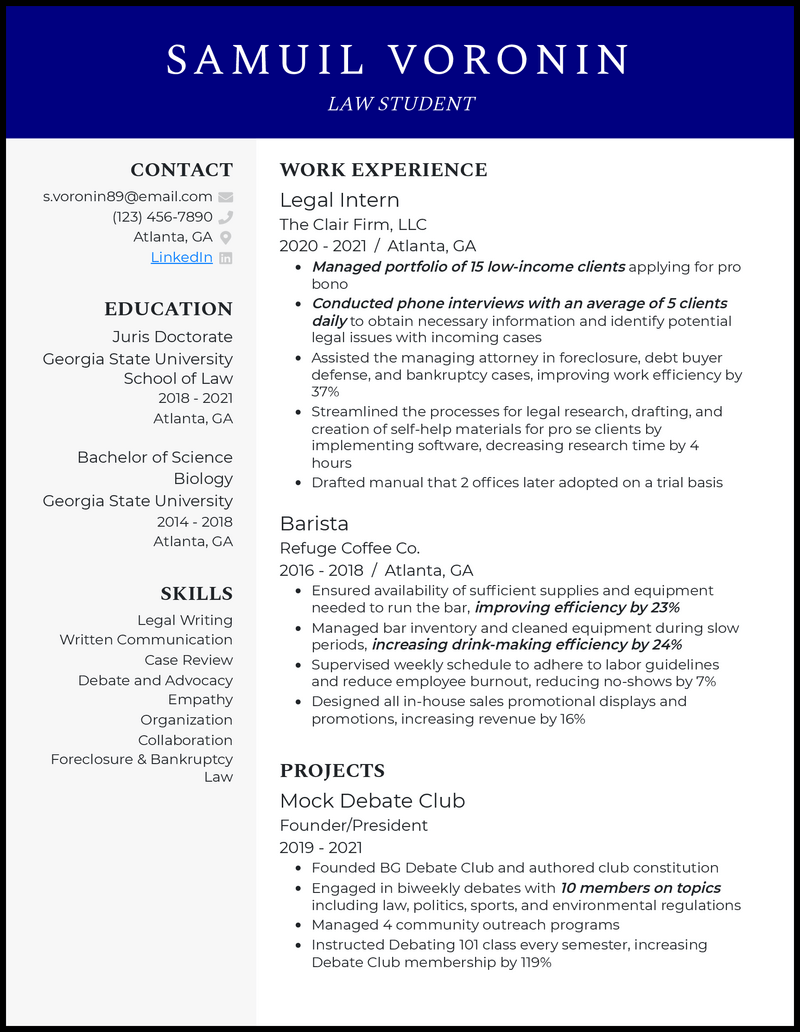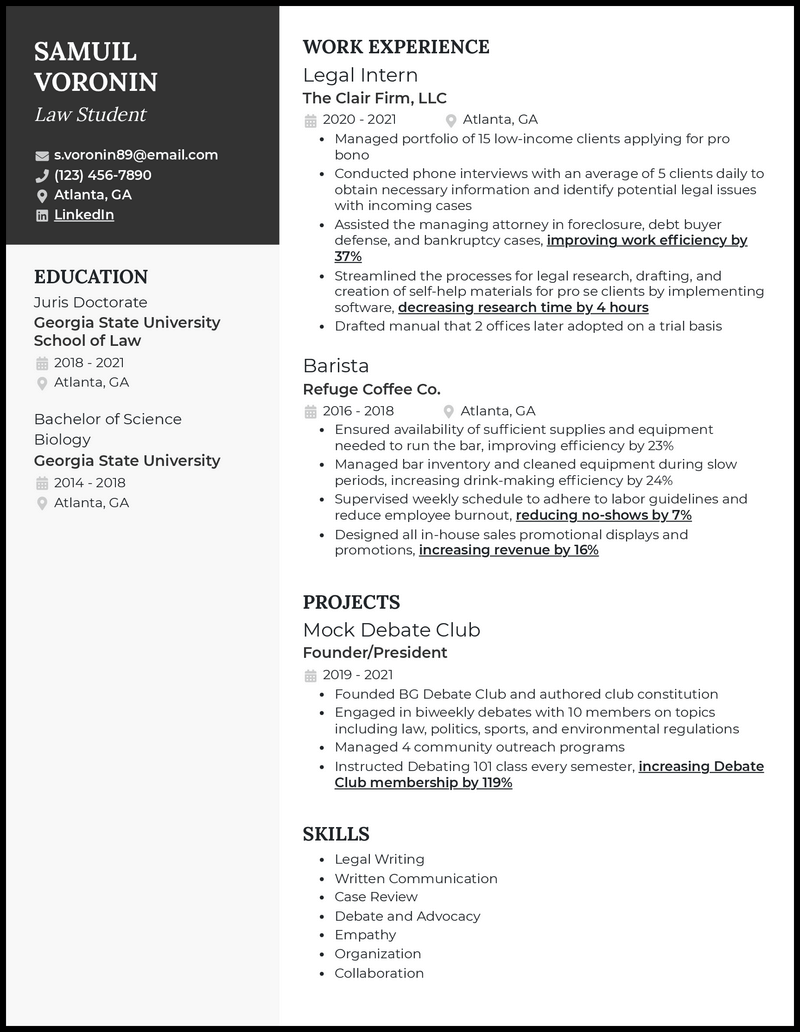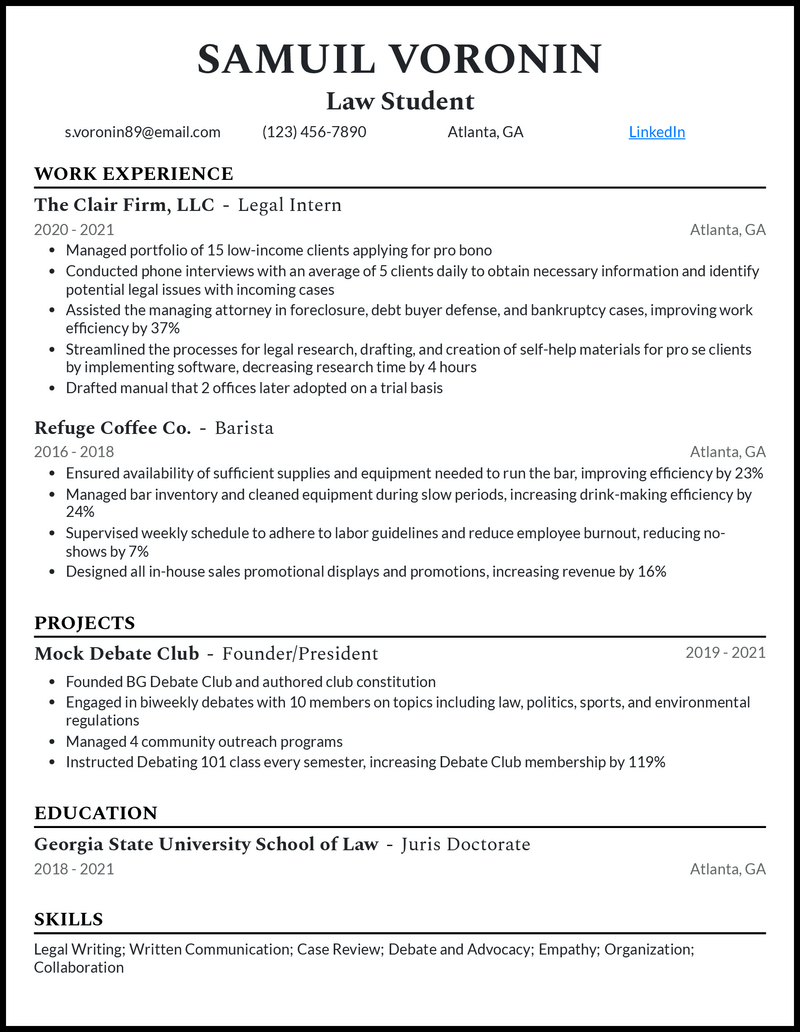It’s time to get your foot in the door with a stellar law student resume that shows off your ability to vary between a few specialized litigation areas, process case records, and uphold regulations.
But how exactly do you do that? What resume template should you select, what job skills should you include in your resume sections, and what sections should you even have on your resume page?
Don’t worry. We’ve helped many professionals in legal roles find their dream jobs. After years of experience, we’ve developed three law student resume examples and a cover letter maker to help you launch your career in the courtroom!
Related resume examples
What Matters Most: Your Skills & Work History

Okay, so as a law student, you might have your Juris Doctorate . . . but not much work experience yet. If you’re fresh out of law school, remember instances from other jobs or internships (related or unrelated to the legal field) that helped you develop translatable skills.
Skills like data entry, communication, and organization transfer nicely to a legal role—but don’t list them in your skills section like that! Hone your skills into things like “case management” and “legal records” instead.
Lean as technical as possible while developing your skills list. Which programs do you use to keep client records in order? What are the profession-specific specialties that fall under the umbrella of your smooth communication abilities?
9 most popular law student skills
- Case Review
- Debate and Advocacy
- Client Records
- MS Excel
- Legal Writing
- Shorthand
- Time Management
- Legal Research
- Wills and Trusts
Sample law student work experience bullet points
Impressive work skills! But recruiters want to see some courtroom-related actions. How did you leverage those skills to create success for clients, attorneys, and peers? Recruiters want to see what you did, how and why you did it, and what kind of positive differences you made.
How did you transform your bookkeeping experience from an old job into more efficient client record keeping? As a law student, remember how many skills from unrelated jobs can transfer over to benefit your new professional role.
Just make sure you provide quantifiable data to back up your impact in the legal office or courtroom. Recruiters want percentages, dollar amounts, and ratings that support your efficacy and readiness to advance in your legal career.
Here are a few examples:
- Instructed Debating 101 class each semester, increasing Debate Club membership by 119%
- Streamlined the processes for legal research, drafting, and creation of self-help materials for pro se clients, decreasing research time by an average of 4 hours per case
- Supervised weekly schedule to adhere to labor guidelines and reduce employee burnout, decreasing turnover rate by 7% and boosting employee satisfaction rates to 4.8/5
- Assisted the managing attorney in foreclosure, debt buyer defense, and bankruptcy cases, improving work efficiency and reducing weekly labor hours by 11 on average
- Designed all in-house promotional displays and digital advertisements, increasing revenue by 16% and client acquisition by 9%
Top 5 Tips for Your Law Student Resume
- Consider your angle
- Keep your specialization goals in mind while you build your resume. Do you have a passion for commercial or family law? Taxation or civil litigation? If you’re applying for a firm specializing in just one or a few legal areas (most do), your resume should give examples of how you’re primed for that particular role.
- . . . But showcase versatility, too
- At the same time, we understand that limited job experience as a student and a broadly-themed legal internship might not convey your personal niche. And that’s okay! You can angle internships and unrelated job experiences toward your desired specialization and still provide a variety of accomplishments that show your adaptability with litigation.
- Consider an objective!
- If your resume’s feeling a bit “patchwork,” you can always spotlight your specialized career goals in an objective statement. Briefly outline why you want that specific job, how you’ll benefit the role, and what qualifies you to deliver.
- Keep it brief
- Your example points should be as streamlined as possible. Again, state what you did, the context for why you did it, how you did it, and your final quantifiable impact. Stick with quality over quantity and avoid fluff.
- Don’t forget to include extra credentials
- Additional certificates can be the cherry on top of your Juris Doctorate and land you that dream job! So don’t leave out other stuff like an Accredited Legal Professional (ALP) or Certified Paralegal certification.
If you only have one or two additional certifications as a law student (which is understandable if you’re just starting out!) then you can place them by your degree. If you have several, they’re worth having their own column!
Definitely! If you’re a fresh law student who’s new to the working world, an internship can provide invaluable work experience points that enhance your credibility. Just make sure you pick the most impressive points that are most similar to those you’d encounter on the job!
If you’re looking for other ways to boost your desirability as a legal candidate, try to think of memorable professors from law school, or even bosses from previous jobs. If any of them are willing to write you a professional reference, take them up on it!








